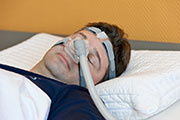- The Best Time of Day to Drink Bone Broth to Maximize Health Benefits
- 8 Ways to Increase Dopamine Naturally
- 7 Best Breads for Maintaining Stable Blood Sugar
- Gelatin vs. Collagen: Which is Best for Skin, Nails, and Joints?
- The Long-Term Effects of Daily Turmeric Supplements on Liver Health
- Could Your Grocery Store Meat Be Causing Recurring UTIs?
- Are You Making This Expensive Thermostat Error This Winter?
- Recognizing the Signs of Hypothyroidism
- 10 Strategies to Overcome Insomnia
- Could Artificial Sweeteners Be Aging the Brain Faster?
Sleep Apnea May Raise Risk of Depression


People with sleep apnea are at increased risk for depression, but continuous positive airway pressure (CPAP) therapy for their apnea may ease their depression, a new study suggests.
The Australian study included 293 men and women who were newly diagnosed with sleep apnea. Nearly 73 percent had depression when the study began. The worse their apnea, the more severe their depression.
However, after three months, only 4 percent of the 228 apnea patients who used CPAP for an average of at least five hours a night still had clinically significant symptoms of depression.
At the start of the study, 41 patients reported thinking about harming themselves or feeling they would be better off dead. After three months of CPAP therapy, none of them had persistent suicidal thoughts.
The study appears in the September issue of the Journal of Clinical Sleep Medicine.
“Effective treatment of obstructive sleep apnea resulted in substantial improvement in depressive symptoms,” including suicidal thoughts, senior study author Dr. David Hillman said in a journal news release. Hillman is a clinical professor at the University of Western Australia and a sleep physician at the Sir Charles Gairdner Hospital in Perth.
“The findings highlight the potential for sleep apnea, a notoriously underdiagnosed condition, to be misdiagnosed as depression,” he added.
People with symptoms of depression should be screened for sleep apnea by being asked about symptoms such as snoring, breathing pauses while sleeping, disrupted sleep and excessive daytime sleepiness, the researchers said.
Sleep apnea affects at least 25 million American adults. Untreated sleep apnea increases the risk of high blood pressure, heart disease, stroke, type 2 diabetes and depression, according to the American Academy of Sleep Medicine.
More information
The American Academy of Family Physicians has more about sleep apnea.
Source: HealthDay
Copyright © 2026 HealthDay. All rights reserved.










